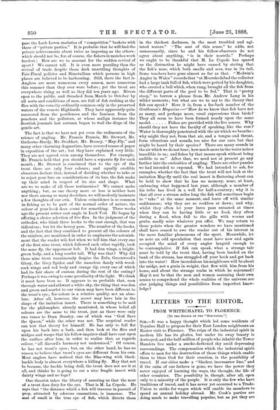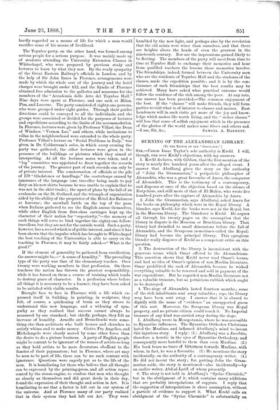LETTERS TO THE EDITOR.
FROM WHITECHAPEL TO FLORENCE.
[To THE EDITOR OF THE "SPECTATOR."]
SIE,—It was a happy thought which led some residents of Toynbee Hall to propose for their East London neighbours an Easter visit to Florence. The reign of the industrial spirit in modern life has its glories, but under its sway beauty is destroyed, and the half-million of people who inhabit the Tower Hamlets live under a smoke-darkened sky amid depressing surroundings. The compensation which the industrial spirit offers to men for the destruction of those things which enable them to bless God for their creation, is the possibility of travel. If our cities make a "blacker, incessanter line," and if the calm of our fathers is gone, we have the power they never enjoyed of learning the ways, the thought, the life of other countries. The possibility is, though, after all, open only to a minority of the people. It is only the few who have traditions of travel, and it has never yet occurred to a Trade- Union to strike for wages which will enable its members to spend an annual holiday abroad. Mr. Cook's parties are doing much to make travelling popular, but as yet they are
hardly regarded as a means of life for which a man would sacrifice some of his means of livelihood.
The Toynbee party, on the other hand, was formed among serious people for a serious purpose. It was mainly made up of students attending the University Extension Classes in Whitechapel, who were prepared by previous study and lectures to learn by what they saw. By the ready sympathy of the Great Eastern Railway's officials in London, and by the help of Sir John Tunes in Florence, arrangements were made by which the whole cost of the journey and the hotel charges were brought under £12, and the Syndic of Florence obtained free admission to the galleries and museums for the members of the " Acca,demia delle Arte del Toynbee Hall." Nine days were spent at Florence, and one each at Milan, Pisa, and Lucerne. The party consisted of eighty-one persons, who were grouped under eight guides. Through their guides directions could be conveyed to all the individuals, and the groups were associated or divided for the purposes of lectures and expeditions according to the limits of the accommodation. In Florence, lectures were given by Professor Villari, the Dean of Windsor, "Vernon Lee," and others, while invitations to villas in the neighbourhood were extended to the whole party. Professor Villari's lecture on "Social Problems in Italy," was given in Dr. Coldstream's salon, in which every evening the party was gathered; the other lectures were given in the presence of the buildings or pictures which they aimed at interpreting. At all the lectures notes were taken, and a " log " committee was appointed to draw together the records of the journey. The greater part of such records can only be of private interest. The consternation of officials at the pile of 179 " Gladstones or handbags," the contretemps caused by ignorance of the language (one traveller being made to pay duty on his new shirts because he was unable to explain that he was not in the shirt trade); the upset of plans by the fall of an avalanche on the St. Grothard, and the triumph of organisation aided by the ability of the proprietor of the Hotel des Balances at Lucerne ; the snowball battle on the top of the pass, when Italians gathered to see the English amuse themselves, while other English from first-class carriages kept up the character of their nation for "superiority,"—the memory of such things will serve to bind together the eighty-one fellow- travellers, but they are not for the outside world. Such a party, however, has a record which is of public interest, and since it has been shown that the impulse which has brought to Whitechapel the best teaching of the Universities is able to carry on the teaching in Florence, it may be fairly asked,—" What is the good ?"
If the element of generality be gathered from recollection, the answer might be,—" A sense of humility." The prevailing type of the party was that of the elementary teacher. Over twenty were working members in that profession. On these teachers the nation has thrown the greatest responsibility, while it has forced on them a course of training which tends to destroy grace of character. In a profession where before all things it is necessary to be a learner, they have been asked to be satisfied with visible results.
Brought face to face in Florence with a life which ex- pressed itself in building, in painting, in sculpture, they felt, of course, a quickening of brain as they strove to understand this new language, and a widening of sym- pathy as they realised that success cannot always be measured by one standard ; but chiefly, perhaps, they felt an increase of humility. Arnolfo and Brtmelleschi were some- thing else than architects who built houses and churches to satisfy whims and to make money. Giotto, Fra Angelico, and Michelangelo were clearly moved by some other force than the desire to do a picture business. A party of English people might be content to be ignorant of the names of artists so long
as they hold artists to be mere decorators obedient to the -fancies of their paymasters; but in Florence, where art may be seen to be part of life, there can be no such content with
ignorance. Questions were eagerly put as to the life of the men. It is humiliating for those who believe that all thought can be expressed by the printing-press, and all action repre- sented by the steam-engine, to confess that men who thought as clearly as themselves and did great deeds in their day, found the expression of their thought and action in Art. It is humiliating to see that a factor is left out in our system of the universe. And at Florence many of our party realised that in their system they had left out Art. They were humbled by the new light, and perhaps also by the revelation that the old saints were wiser than ourselves, and that there are heights above the heads of even the greatest in the nineteenth century. Nor are the impressions gained likely to be fleeting. The members of the party will meet from time to time at Toynbee Hall to exchange their memories and hear from qualified teachers the lessons those memories involve. The friendships, indeed, formed between the University men who are the residents of Toynbee Hall and the students of the classes, made the expedition possible ; and it is by the con- tinuance of such friendships that the best results may be achieved. Many have asked what practical outcome would follow the residence of the rich among the poor. At any rate, one answer has been provided,—The common enjoyment of the best. If the " classes " will make friends, they will form parties to visit what is of interest to classes and masses. East Londoners will in such visits get more of the joy and know- ledge which makes life worth living, and the" richer classes" will lose that sense of selfish enjoyment which in the presence of the glories of the world makes some blas(cs and others sad.







































 Previous page
Previous page